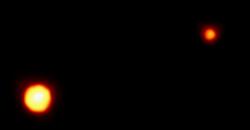 There are literally millions of objects orbiting the sun, but some of them are as tiny as your hand. And some of them, while quite large (i.e., the surface area of the United States, say), are not spherical. Are those technically "planets"?
There are literally millions of objects orbiting the sun, but some of them are as tiny as your hand. And some of them, while quite large (i.e., the surface area of the United States, say), are not spherical. Are those technically "planets"?
You may have heard about the gathering of world’s astronomers in Prague. Their mission: to define what a "planet" is.
Today, the body of smart people (2,409 of them, from 75 countries) were to vote on this definition of a "planet":
- A planet is a celestial body that (a) is in orbit around the Sun, (b) has sufficient mass for its self-gravity to overcome rigid body forces so that it assumes a hydrostatic equilibrium (nearly round) shape, and (c) has cleared the neighbourhood around its orbit.
- A dwarf planet is a celestial body that (a) is in orbit around the Sun, (b) has sufficient mass for its self-gravity to overcome rigid body forces so that it assumes a hydrostatic equilibrium (nearly round) shape, (c) has not cleared the neighbourhood around its orbit, and (d) is not a satellite.
- All other objects orbiting the Sun shall be referred to collectively as "Small Solar System Bodies".
The resolution passed, and Pluto does not fit the definition of a classical planet. It does, however, fit the definition of a "dwarf planet".
Sorry to shake up your universe like that, but I thought you would like to know.

